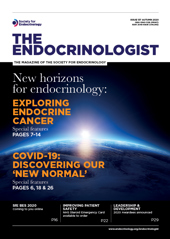Last November, the Society for Endocrinology held what was described as its ‘biggest and best’ public engagement event for schools.
Since 2017, this initiative has become an established and distinctive part of the annual Society for Endocrinology BES conference. It provides school pupils with the opportunity to join delegates for a dedicated afternoon of insights into the world of endocrinology. Revealing the everyday face of the specialty, the event included opportunities to engage in hands-on interactive activities, and to meet the scientists, nurses and doctors who make up the Society’s membership.
I have always been passionate about creating inclusive scientific communities. Therefore, it has been a natural and proactive step to work within the Society to bring endocrinology to a wider audience, including pupils, who would not normally have the opportunity to experience such events. Consequently, I have had the pleasure to lead the organisation of the last two schools’ public engagement events, in Glasgow (2018) and Brighton (2019).
STEPPING UP FOR BRIGHTON
After Glasgow, Brighton was always to be a ‘step up’, with the support of outreach representatives from the two local universities and the STEM ambassador hub. We had a phenomenal response: over 100 pupils (14–16 years) and teachers from local schools wanted to attend. The location was also fantastic, as we had the large restaurant lounge at the Brighton Centre to work in, directly overlooking the seafront. Visualising the space and how it could be utilised is an essential part in planning any public engagement event. Along with the perfect place to set up an auditorium for the introductory ‘live’ show and the concluding Q&A session, we had a great networking area to position the tables and poster boards for the hands-on activities.
I opened the conference with an interactive presentation on ‘you and your hormones’, which of course had plenty of fake blood on hand, to demonstrate the main way hormones are transported around the body! Other props included Christmas tree lights with a ‘Post-it’ race to help express the different ways and speeds chemical messengers are transmitted around the body. Afterwards, there was the opportunity for everyone to get involved in the hands-on activities. The pupils also alternated between networking sessions to meet and talk directly to the scientists, doctors and nurses about their careers and what they really do.
This year, we encouraged activities that showcased the fantastic ideas members had developed through the Society’s Public Engagement Grant. One, from King’s College London, was their ‘islet transplantation skills’ activity, which included 3D printed endocrine organs. Other activities included a ‘human cell signalling relay’ demonstrating what happens when a hormone delivers its final message to a cell and what can go wrong. This presented a fun way for pupils to learn about cell signalling and cancer, using energy sticks and plenty of balls. I developed the relay last year for Glasgow, but it was the enthusiasm of Kgabolele Manyathela (one of Kingston University’s biochemistry undergraduates) in delivering it that no doubt led to it being polled the most enjoyable activity by visiting pupils.
With help from Vas Chortis (University of Birmingham), I also developed ‘make your diagnosis’. This lets pupils take on the role of a doctor gathering clues about patients’ symptoms. It required taking vital statistics and interpreting some blood test results for thyroid disease to learn the impact hormones can have in making people ill. Hal, our fully sized patient simulator (who can only be described as an inflexible 75kg dead weight) will always be remembered by the Kingston team for our attempts to get him in and out of the back seat of my car for the event.
The schools’ afternoon at the annual Society for Endocrinology BES conference has proved to be a great way to engage and inspire a future generation of endocrinologists. We are grateful to all the members who have volunteered each year to make it such a success. Visiting pupils and teachers have always been very positive, describing the event as fun and very educational, where they have learnt a lot about potential future careers.
WHERE NEXT?
Despite this great success, there are now questions around the future direction of such public engagement events at a time of social distancing. Just 4 months on from SfE BES 2019, the UK was placed in COVID-19 lockdown and, even with lockdown gradually easing, it’s hard to imagine the complete return to such an intense face-to-face and highly interactive hands- on format in the foreseeable future.
In the short term, there has been the cancellation of many planned events, as the sector re-orientates itself. One casualty was Clinical Update (now postponed from April 2020), where Heather Lampard (Society Careers and Engagement Officer) and I had already planned the public engagement training session for the day of the Career Development Workshop. Another personal loss was the Big Bang Fair at Kingston University (scheduled for June), with great plans to work with the Society and present the ‘human cell signalling relay’ and ‘make your diagnosis’ again.
FUTURE OPPORTUNITIES
New challenges present new opportunities. I recall conversations before COVID with teachers at Brighton, regarding their disappointment in having to choose between the students to bring and those to leave behind, due to limited availability at the venue for each school. There is the need to consider broadening reach, being more inclusive and flexible and perhaps not always tying down events to selected venues, spaces and time constraints. Certainly, in the immediate future, the online world offers many new possibilities but, even then, we will have to learn to deliver our message very differently!
NIGEL PAGE
Public Engagement Committee
Endocrine Ambassador, Kingston University London
The next application deadline for the Society’s Public Engagement Grant is in March 2021.






